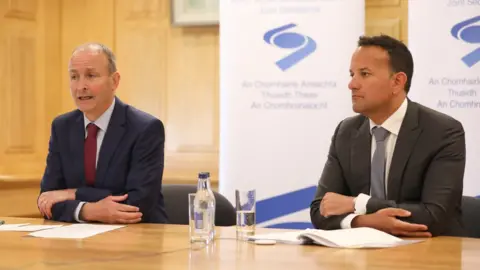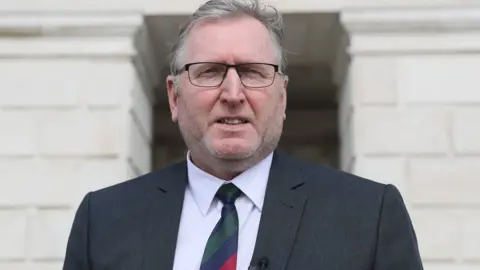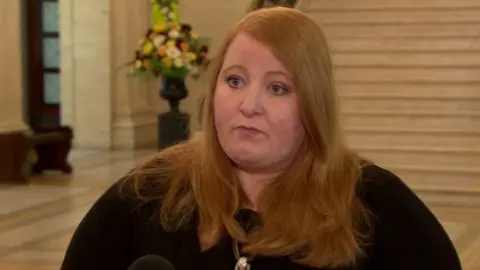NI Protocol: DUP could quit from Stormont 'within weeks'
The Democratic Unionist Party may quit Stormont "within weeks" if its demands over the Northern Ireland Protocol are not met, its leader has suggested.
Sir Jeffrey Donaldson also said he feared a return to the loyalist street violence seen earlier in the year unless the issue was resolved.
He said his party would also now boycott most north-south ministerial meetings.
He said relations could not be "business as usual".
Most Stormont parties criticised the speech while the EU's Brexit negotiator called for calm.
During his speech in Belfast, Sir Jeffrey said it would be clear "within weeks" if there was a basis for the assembly and executive to continue, or if an election was needed.
"I say not as a threat, but as a matter of political reality, that our political institutions will not survive a failure to resolve the problems that the protocol has created," Sir Jeffrey said.
"Neither will they survive an indefinite 'stand still' period; urgent action is needed."
He also said DUP ministers would resign from their posts rather than implement further border checks on goods entering Northern Ireland from Great Britain.
"If in the final analysis those who are democratically elected by the people of Northern Ireland lack the power to prevent such checks, and the protocol issues remain, then the position in office of DUP Ministers would become untenable," Sir Jeffrey added.
The protocol is part of the UK government's Brexit deal with the European Union.
It keeps Northern Ireland aligned with the EU's single market for goods to ensure free trade across the Irish border.
However, it has led to additional checks on goods being traded across the Irish Sea, which has drawn criticism and protests from unionists.
Not all the checks have been implemented due to what are known as grace periods.

A blunt message for Downing Street

Sir Jeffrey Donaldson laid it out pretty clearly today.
His message for the government was blunt - you can either have the political institutions or the protocol - you can't have both.
In terms of the mechanics of how you bring down government in Northern Ireland, essentially what has to happen is that the first minister or deputy first minister needs to resign.
There then is a period of seven days, and if the positions are not filled within that period, it's over to the secretary of state who has to set a date within a reasonable period of time for an election.
However, we know from James Brokenshire's time as secretary of state, that a reasonable period can last for months and months on end.
There's no guarantee that if the DUP walk away from government that we will end up in an election within a matter of weeks.
The smart money would suggest that Brandon Lewis may well take the view that there is no point in calling an election when we have one already scheduled for next May.

Earlier this week the UK government indefinitely extended the grace periods which it said was necessary to create space for further talks with the EU.
Sir Jeffrey's speech came as the European Commission Vice President Maros Sefcovic began a two-day visit to Northern Ireland for talks with business and political leaders.
North-south meetings
Sir Jeffrey, the MP for Lagan Valley, said he believed in devolution and wanted to return to the assembly as an assembly member (MLA).
He said he wanted to provide a "window of opportunity" to find a solution and expressed concern there could be a return to disorder on Northern Ireland's streets "unless we grapple with this issue".
The DUP leader outlined four steps his party would take, including an end to its engagement with north-south bodies, except for co-operation on health matters.
The north-south arrangements, provisioned for by the Good Friday Agreement, feature six all-Ireland bodies, with responsibility for matters such as waterways and food standards, which operate under the policy direction of the North-South Ministerial Council.
 Julien Behal Photography
Julien Behal PhotographyIt is comprised of ministers from both sides of the border.
Ministers from Northern Ireland are required to attend under the Ministerial Code of office.
The DUP attended the last meeting of the council in July.
Sir Jeffrey said this was done "as an act of good faith" but issues remain unresolved.
"Therefore, as the protocol issues remain unresolved, the DUP will immediately withdraw from the structures of Strand Two of the Belfast Agreement relating to north south arrangements, while we will ensure important health related matters continue to be addressed on a cooperative basis," he said.
What else did he say?
Sir Jeffrey also outlined that DUP ministers would "seek to block additional checks at the ports" and would examine the legality of the current checks and "whether they should have required executive approval".
The DUP leader also explained his executive team would "seek to frustrate and prevent" alignment between NI Assembly legislation and laws passed by the EU.
"Let me be clear if the choice is ultimately between remaining in office or implementing the protocol in its present form, then the only option for any unionist minister would be to cease to hold such office," he said.
"Time is short and consequences will follow.
"The prize of a successful outcome is not just for unionism, but for all of Northern Ireland and it is not just for the UK, but for the EU as well."
Sir Jeffery said he feared a return to street violence in loyalist areas witnessed in April.
"Since the start of July, the streets have been quieter in terms of violence, but I fear that unless we grapple with this issue, this will prove to be merely a pause, rather than an end to the disorder," he said.
He echoed this view in an interview later with the BBC's Political Thinking podcast with Nick Robinson.
"If politics fails ... then I fear there will be others who may decide to step into the gap," he said.
He went on to say that he and other community leaders had "been saying to the boys on the streets please don't be on the streets" and that as a result, Northern Ireland had been peaceful "all summer".
Election potential?
A DUP withdrawal from its executive roles, including first minister, would not automatically trigger an assembly election, however, it would begin the process.
Given the joint nature of the office, First Minister Paul Givan's departure would also remove Sinn Féin's Michelle O'Neill as Deputy First Minister.
This would then start a seven-day process for the parties to agree to fresh nominations..
If this did not happen, NI Secretary Brandon Lewis would be responsible for calling an election within a "reasonable" timeframe.
What has the reaction been to the speech?
Taoiseach Micheál Martin said the speech had "created new challenges".
Sinn Féin President Mary-Lou McDonald said it was a "reckless, irresponsible and short-sighted election stunt".
She said the DUP was "clearly in panic mode, driven by poor opinion polls" and are "focused on their own narrow self-interest".
 PA Media
PA MediaSDLP leader Colum Eastwood said it was "naive in the extreme" and that the DUP leader had "offered no solutions".
"I think it is very dangerous when people are languishing on waiting lists and we're dealing with a global pandemic, we have people playing indulgent games that are more about polls than protocols," he told BBC NI's The Nolan Show.
Alliance Party leader and Stormont Justice Minister Naomi Long said there was a need for "pragmatic solutions" to protocol matters rather than for "people to escalate this into a constitutional crisis".

Mrs Long described Sir Jeffrey's address as "cynical party posturing to try and recover perceived electoral losses because of polling".
'Double disappointing'
Ulster Unionist Party (UUP) leader Doug Beattie said his party shared the DUP's concerns about the protocol, but that it would be a "bad idea" to collapse Stormont.
"The problem is we do need to have some sort of a treaty which deals with the issues between the United Kingdom and the European Union," he said.
On Tuesday, the UUP published a paper detailing its recommendations "for a common-sense solution to the problems created by the protocol".
It included provisions for a new criminal offence "to knowingly export goods designed for the UK internal market into the EU single market".
Traditional Unionist Voice (TUV) leader Jim Allister said Sir Jeffrey's speech included "some fine words", but "it is actions that count".
Simon Coveney, the Irish Foreign Affairs Minister, said unionist concerns about the protocol had been "taken seriously", but "no positive agenda is served by blocking practical north-south co-operation or by the breakdown of the other institutions of the Good Friday Agreement".
"The EU is already listening closely to concerns in Northern Ireland and is ready to work in good faith to minimise friction," he continued.
